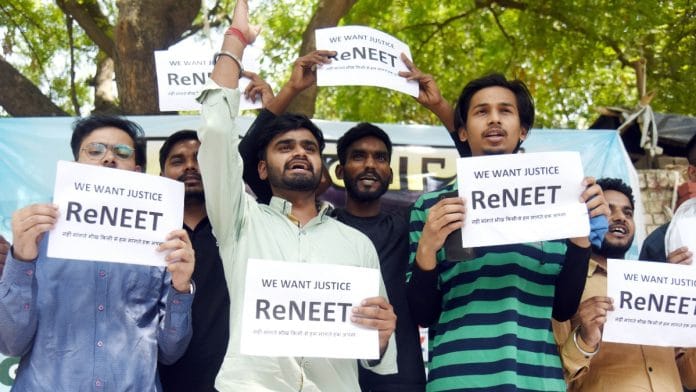The National Eligibility-cum-Entrance Test or NEET has always been a high-stakes, high-risk examination because of the competition for medical seats in India. The current outrage and controversy about NEET 2024 isn’t surprising, given that the examination system has several loopholes that can be manipulated. Unless these problems are corrected, no matter how many culprits are caught and punished, new ones will continue to emerge.
The government set up the National Testing Agency (NTA) in November 2017 to address the need for a professional examination body, similar to the Educational Testing Service (ETS) to conduct various entrance examinations for admissions into premier institutions and medical colleges.
Till then, CBSE, which is an academic authority, was conducting high-priority examinations like NEET and Joint Entrance Exam (JEE). These exams are highly competitive, involving more than 40 lakh candidates, and require specialised capacity and expertise in both testing and logistics. Moreover, the field of testing, especially in online mode, is evolving into a scientific discipline that requires the development of specialised technical knowledge. The NTA was established to develop these capabilities.
Need for a fraud-proof system
The mandate for the NTA was to conduct these examinations as online tests with foolproof cybersecurity protocols. This is because paper-based exams are highly risky, involving more than 11 points of human interface with potential for leakage and manipulation. These points include setting the question paper, pre-print activities, printers/printing, packing of question papers, transportation, storage, distribution to exam centres, pre-test activities at the centre, post-test manipulations (as seen in the recent case in Godhra, Gujarat, which could be just the tip of the iceberg), transportation of the filled OMR sheets to scanning centres, and the scanning process.
Any unscrupulous element can manipulate these processes despite the best care taken in their conduct, especially in exams like the NEET, where high stakes and big money are involved.
Also read: Alakh Pandey of Physics Wallah has turned into messiah of NEET 2024 students overnight
The online examination process, on the other hand, eliminates these risks. The question paper setting is automated, drawing from a large question bank with standardised and classified items prepared over time. The questions are directly sent to the candidate in the exam room using the highest levels of encryption to beat the cyber fraud. This system, therefore, tends to eliminate the chances of leakage. If there are more candidates than the capacity allows, the exam is conducted in batches.
With moderation of question papers and normalisation of the marking system, a level playing field is assured for each student, irrespective of the batch in which they take the exam. This technique has been perfected by reputed exam-conducting bodies like ETS and the Graduate Management Admission Council (GMAC). Using these techniques, it is entirely possible to conduct exams involving a large number of candidates with the highest levels of professionalism, accuracy and confidentiality.
Unfortunately, when the NTA, mandated to conduct NEET, proposed using the online process, the Ministry of Health refused, stating that the modality of the examination is determined by the Supreme Court and therefore an online exam could not be conducted. This appeared dubious because the Supreme Court had upheld the conduct of online exams for JEE. The Ministry’s logic was that since there are more than two million candidates, the online process is unsuitable. Thanks to this decision, today the government is facing flak for the alleged irregularities in the conduct of the NEET exam. It is time for better sense to prevail, and for a scientific and fraud-proof system to be chosen to checkmate the games played by unscrupulous elements both within and outside the system.
The real solution, however, lies elsewhere. A one-time examination for selection or elimination violates the basic principles of educational testing. Methods can be developed for multiple, continuous tests, which would provide opportunities for accurately measuring aptitudes and abilities. There are ways to do this, provided decision-makers are willing to listen.
R Subrahmanyam is a Former Secretary to the Government of India, Higher Education Department. He tweets @subrahyd. Views are personal.
(Edited by Ratan Priya)






